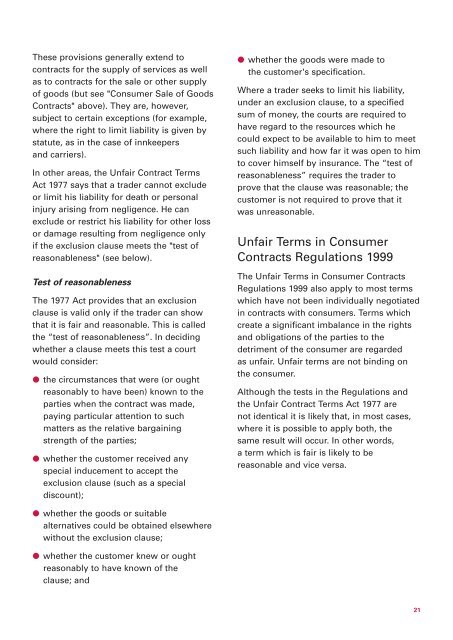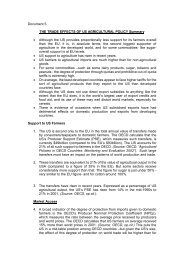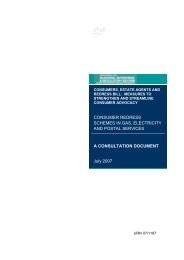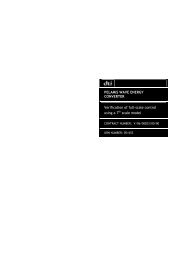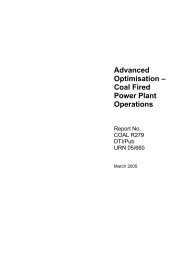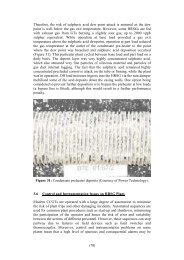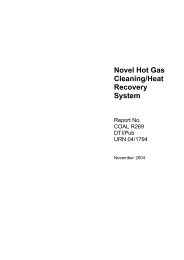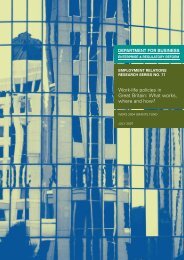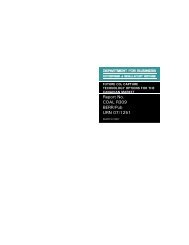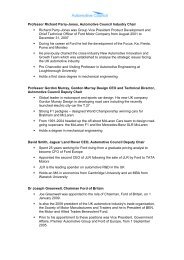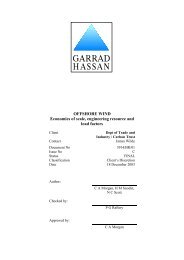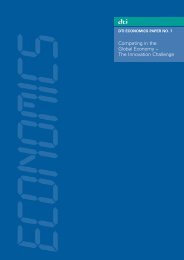A traders guide: the law relating to the - DTI Home
A traders guide: the law relating to the - DTI Home
A traders guide: the law relating to the - DTI Home
You also want an ePaper? Increase the reach of your titles
YUMPU automatically turns print PDFs into web optimized ePapers that Google loves.
These provisions generally extend <strong>to</strong><br />
contracts for <strong>the</strong> supply of services as well<br />
as <strong>to</strong> contracts for <strong>the</strong> sale or o<strong>the</strong>r supply<br />
of goods (but see "Consumer Sale of Goods<br />
Contracts" above). They are, however,<br />
subject <strong>to</strong> certain exceptions (for example,<br />
where <strong>the</strong> right <strong>to</strong> limit liability is given by<br />
statute, as in <strong>the</strong> case of innkeepers<br />
and carriers).<br />
In o<strong>the</strong>r areas, <strong>the</strong> Unfair Contract Terms<br />
Act 1977 says that a trader cannot exclude<br />
or limit his liability for death or personal<br />
injury arising from negligence. He can<br />
exclude or restrict his liability for o<strong>the</strong>r loss<br />
or damage resulting from negligence only<br />
if <strong>the</strong> exclusion clause meets <strong>the</strong> "test of<br />
reasonableness" (see below).<br />
Test of reasonableness<br />
The 1977 Act provides that an exclusion<br />
clause is valid only if <strong>the</strong> trader can show<br />
that it is fair and reasonable. This is called<br />
<strong>the</strong> “test of reasonableness”. In deciding<br />
whe<strong>the</strong>r a clause meets this test a court<br />
would consider:<br />
<strong>the</strong> circumstances that were (or ought<br />
reasonably <strong>to</strong> have been) known <strong>to</strong> <strong>the</strong><br />
parties when <strong>the</strong> contract was made,<br />
paying particular attention <strong>to</strong> such<br />
matters as <strong>the</strong> relative bargaining<br />
strength of <strong>the</strong> parties;<br />
whe<strong>the</strong>r <strong>the</strong> cus<strong>to</strong>mer received any<br />
special inducement <strong>to</strong> accept <strong>the</strong><br />
exclusion clause (such as a special<br />
discount);<br />
whe<strong>the</strong>r <strong>the</strong> goods or suitable<br />
alternatives could be obtained elsewhere<br />
without <strong>the</strong> exclusion clause;<br />
whe<strong>the</strong>r <strong>the</strong> cus<strong>to</strong>mer knew or ought<br />
reasonably <strong>to</strong> have known of <strong>the</strong><br />
clause; and<br />
whe<strong>the</strong>r <strong>the</strong> goods were made <strong>to</strong><br />
<strong>the</strong> cus<strong>to</strong>mer's specification.<br />
Where a trader seeks <strong>to</strong> limit his liability,<br />
under an exclusion clause, <strong>to</strong> a specified<br />
sum of money, <strong>the</strong> courts are required <strong>to</strong><br />
have regard <strong>to</strong> <strong>the</strong> resources which he<br />
could expect <strong>to</strong> be available <strong>to</strong> him <strong>to</strong> meet<br />
such liability and how far it was open <strong>to</strong> him<br />
<strong>to</strong> cover himself by insurance. The “test of<br />
reasonableness” requires <strong>the</strong> trader <strong>to</strong><br />
prove that <strong>the</strong> clause was reasonable; <strong>the</strong><br />
cus<strong>to</strong>mer is not required <strong>to</strong> prove that it<br />
was unreasonable.<br />
Unfair Terms in Consumer<br />
Contracts Regulations 1999<br />
The Unfair Terms in Consumer Contracts<br />
Regulations 1999 also apply <strong>to</strong> most terms<br />
which have not been individually negotiated<br />
in contracts with consumers. Terms which<br />
create a significant imbalance in <strong>the</strong> rights<br />
and obligations of <strong>the</strong> parties <strong>to</strong> <strong>the</strong><br />
detriment of <strong>the</strong> consumer are regarded<br />
as unfair. Unfair terms are not binding on<br />
<strong>the</strong> consumer.<br />
Although <strong>the</strong> tests in <strong>the</strong> Regulations and<br />
<strong>the</strong> Unfair Contract Terms Act 1977 are<br />
not identical it is likely that, in most cases,<br />
where it is possible <strong>to</strong> apply both, <strong>the</strong><br />
same result will occur. In o<strong>the</strong>r words,<br />
a term which is fair is likely <strong>to</strong> be<br />
reasonable and vice versa.<br />
21


